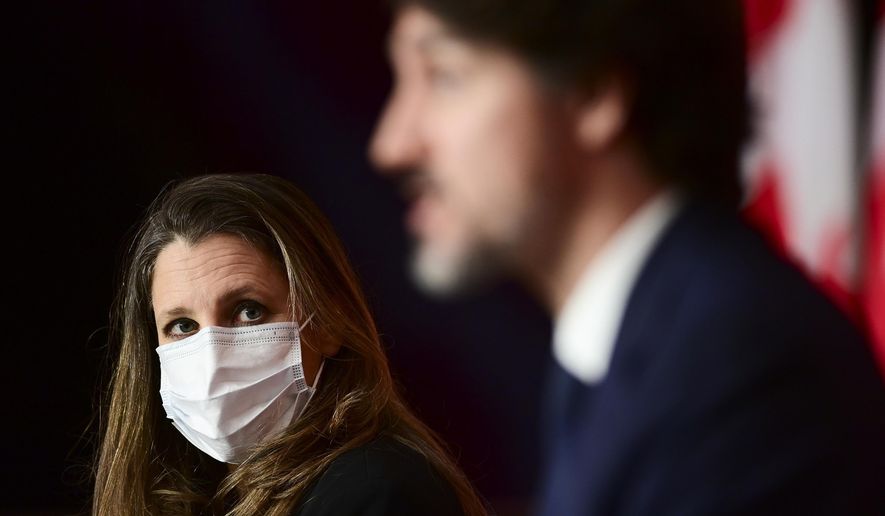America’s USMCA neighbors are unhappy with President Biden’s proposed electric car subsidies for unionized U.S. carmakers, putting in question a key piece of the administration’s climate agenda as it nears a critical test in the Senate.
The Canadian government over the weekend joined the Mexican government in escalating the fight over a provision in Mr. Biden’s roughly $1.75 trillion social spending package now on Capitol Hill that offers a lucrative tax credit for electric vehicles made by union workers in America. Officials in both capitals say they are readying retaliatory tariffs if the U.S.-only tax credits are adopted.
The North American auto production market is one of the most integrated in the world, and even with the revised U.S.-Mexico-Canada Agreement (USMCA) that went into effect in mid-2020, billions of dollars in cross-border trade in vehicles and parts remains a central feature of the market.
Canadian Deputy Prime Minister Chrystia Freeland sent a letter Friday to Senate leaders threatening retaliatory tariffs unless the White House strips the proposed tax credits from Mr. Biden’s Build Back Better Act.
“We are deeply concerned that certain provisions of the electric vehicle tax credits as proposed in the Build Back Better Act violate the United States’ obligations under the United States-Mexico-Canada Agreement,” Ms. Freeland wrote, referring to the trade pact.
“The proposal is equivalent to a 34% tariff on Canadian-assembled electric vehicles.”
SEE ALSO: U.S., G-7 allies demand Russia pull back from Ukraine border, warn of ‘massive’ response
Mr. Biden’s big bill, if enacted, would provide a $7,500 tax credit for consumers that purchase electric vehicles throughout 2026. Car buyers would be eligible to receive a further $4,500 credit if they purchase a vehicle manufactured at a union-run plant located in the U.S.
After Mexico, South Korea, Japan and a number of European countries complained about the proposal in a letter in October, U.S. Trade Representative Katherine Tai said her office backs the administration’s support for the electric car industry and that she had had talks with countries unhappy with the offending provision.
The administration “is committed to tackling the threat of climate change by supporting the transition to electric vehicle manufacturing,” USTR spokesman Adam Hodge said in a statement to the Reuters news agency on Dec. 3. “We will continue to engage a range of stakeholders, including our close trading partners, as Congress considers legislation to strengthen U.S. leadership in the sector.”
But the combined $12,500 credit poses a significant “threat to the Canadian automotive industry,” according to Ms. Freeland.
“This issue is at the top of Canada’s agenda with the United States,” she wrote. “We want to be clear that if there is no satisfactory resolution to this matter, Canada will defend its national interest … [by] applying tariffs on American exports in a manner that will impact American workers in the auto sector and several other sectors of the U.S. economy.”
Mexican officials have sounded a similar note, saying the Biden subsidy would effectively be more punitive than straight automotive tariffs President Trump threatened during the USMCA negotiations.
“President Trump at the time proposed to implement a national security measure to impose a 25% tariff on all imports to the United States,” Mexican Undersecretary for Foreign Trade Luz Maria de la Mora told The Hill newspaper earlier this month. “This proposed measure would be equivalent to a tariff that’s higher than the 25% that Trump proposed at the time and that we all thought was a crazy idea.”
SEE ALSO: Democrat, GOP lawmakers seek favor with Manchin over social welfare bill
In her letter, Ms. Freeland noted that Canada is the top market of U.S. “automotive exports, buying about 10%” of all American-produced vehicles annually.
Senate Majority Leader Charles E. Schumer is pushing to hold a vote on the spending package before Christmas, though not all Senate Democrats are on board with the bill. One of the main holdouts, Sen. Joe Manchin III of West Virginia, has raised concerns specifically about the electric vehicle tax credit.
Last month in an interview with Automotive News, Mr. Manchin argued that subsidizing electric vehicles from union shops would be un-American and wrong.
“We should not use everyone’s tax dollars to pick winners and losers,” Mr. Manchin told the auto industry trade publication.
• Haris Alic can be reached at halic@washingtontimes.com.
• David R. Sands can be reached at dsands@washingtontimes.com.




Please read our comment policy before commenting.